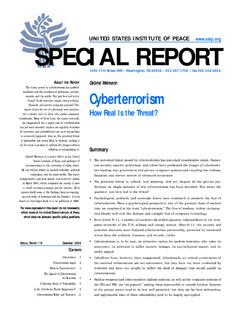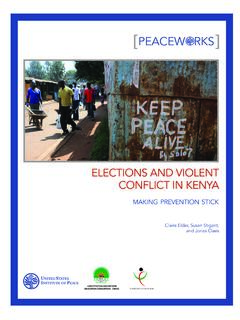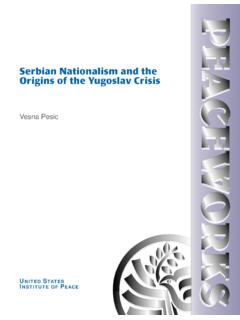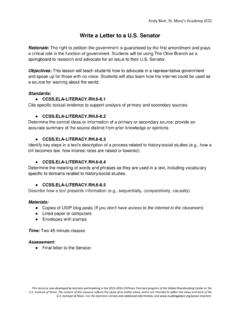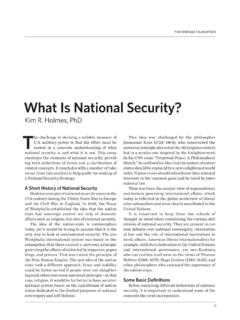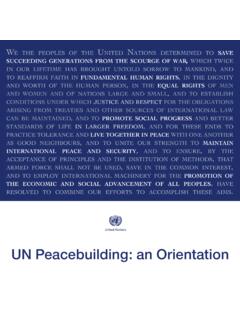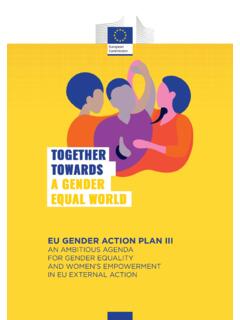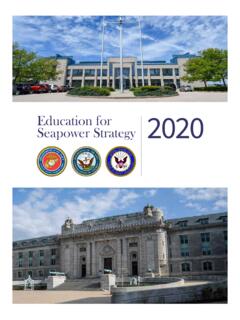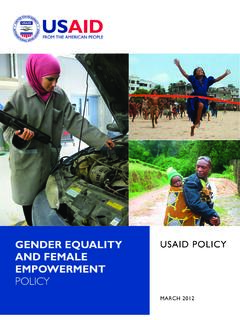Transcription of Afghanistan Study Group Final Report
1 Afghanistan Study Group Final ReportFEBRUARY 2021 Afghanistan S TUDY GROUPThis Report , which was drafted in December 2020 and January 2021, represents the consensus of a bipartisan and independent Study Group with diverse expertise and affiliations. No member may be satisfied with every formulation and argument in isolation. The findings of this Report are solely those of the Afghanistan Study Group . They do not necessarily represent the views of the United States Institute of peace or the senior advisers who contributed their time and expertise to the deliberations of the Group and the content of this Report .
2 All members and senior advisers participated in their personal capacity and on a volunteer includes artwork by Pyty/Shutterstock. Maps on pages 5 and 7 created by Lucidity Information States Institute of Peace2301 Constitution Avenue NW Washington, DC 20037 Phone: Fax: E-mail: Web: www . Kelly A. AyotteGeneral Joseph F. Dunford Jr. (Ret.)Ms. Nancy LindborgStudy Group MembersMs. Nisha BiswalAmbassador James DobbinsSenator Joe DonnellyMs. Mich le FlournoyMs. Susan GordonAmbassador Mark GreenAmbassador Marc GrossmanMr.
3 Stephen J. HadleyMr. David MilibandMs. Lisa MonacoDr. Meghan O SullivanGeneral Curtis Scaparrotti (Ret.)Making peace PossibleMembers of the Afghanistan Study GroupLetter from the Co-chairs .. 2 Executive Summary .. National Interests and Afghanistan .. 6A New Pathway for peace .. 8 Alternative Pathways .. 9 Conclusion .. 10 Introduction .. 11 Interests and Key Judgments .. National Interests and Afghanistan .. 13 Key Judgments .. 15 Analytical Assessments .. 19 Status of the peace Process .. 19 Evolution of the Terrorist Threat from Afghanistan .
4 22 Afghanistan s Economic Dependency .. 24 Politics and the State .. 30 Civil Society, Rights, and Social Gains .. 34 The Afghan National Defense and security Forces .. 36 The Taliban: Organization and Objectives .. 38 Regional Stakeholders and Dynamics .. 40 The Strategic Logic behind a New Approach .. 44 Recommendations .. 471. Clarify the End State .. 472. Reinforce the Conditionality of a Final Troop Withdrawal .. 473. Clarify the Commitment to the Current Afghan State .. 494. Work Diplomatically to Promote the Success of the Negotiation Process.
5 515. Design an Overarching Regional Diplomatic Strategy .. 52 Alternative Pathways .. 56 Conclusion .. 59 Annexes .. 601. Afghanistan Study Group Enabling Legislation .. 602. Members of the Afghanistan Study Group and Senior Advisers .. 613. Consultations .. 634. Methodology .. 665. Policy Pathways .. 706. Text of the Doha Agreement .. 777. Text of the Joint Declaration .. 80 Notes .. 83 ContentsAfghanistan Study Group Final ReportA Pathway for peace in AfghanistanFEBRUARY 2021 Afghanistan Study Group | Final Report2 Letter from the Co-chairsWe submit this Report with a sense of humility gained from confronting over the past nine months a problem of historic complexity, as well as with guarded optimism that we have, for the first time since 2001.
6 An opportunity and framework to achieve a just and durable peace in Afghanistan if we make the hard choices to align our efforts and resources to the current peace process. This Report is provided to, and at the request of, those in Congress who oversee American foreign policy and provide the resources to ensure that our national interests are met. The Afghanistan Study Group began its Congressionally mandated work in April 2020, just weeks after the United States and the Taliban signed an agreement (the Doha agreement ) on the conditions for a troop withdrawal that would end our long military engagement in Afghanistan .
7 This framework for a negotiated peace informed our recom-mendations, which are based on recognizing the imperative of a negotiated conclusion to this long conflict while safe-guarding our long-term interests. Early in its efforts, the Study Group concluded that the United States continues to have significant interests in Afghanistan . We have an interest in Afghanistan not be-coming again a safe haven for terrorists who can threaten us. We have an interest in a stable Afghanistan that is not a threat to its region.
8 And we have an interest in an Afghanistan that respects basic human rights. We do not, however, believe that securing these interests requires a permanent military presence in the contrary, a pathway now exists that can allow the return of our men and women in uniform under conditions that honor the sacrifices that have been made and that protect our interests. While we commend the diplomatic efforts that have created this pathway, we believe a signif-icant revision of policy is required to make the most of this opportunity.
9 The main elements of this revision are: An immediate diplomatic effort to extend the current May 2021 withdrawal date in order to give the peace process sufficient time to produce an acceptable result. A recognition that, in addition to conducting coun-terterrorism operations and supporting the Afghan National Defense and security Forces, a key objective of the ongoing military presence is to help create conditions for an acceptable peace agreement. The February 2020 Doha agreement and the subsequent troop reductions clearly demonstrated that the United States is prepared to withdraw from Afghanistan .
10 It should not, however, simply hand a victory to the Taliban. Continued basic support, with other donors, for the essential institutions of the Afghan state, including security institutions, while continuing to message our Afghan partners that this support is not open-ended and is conditioned on progress in the peace talks. A key consideration of the Study Group was that while we support the values of the Afghan government and rec-ognize that its collapse could create significant problems for the region and beyond, decisions about America s presence in Afghanistan cannot be held hostage to the di-visions, ineffectiveness, corruption, and shortsightedness that the Afghan government has too often displayed.
